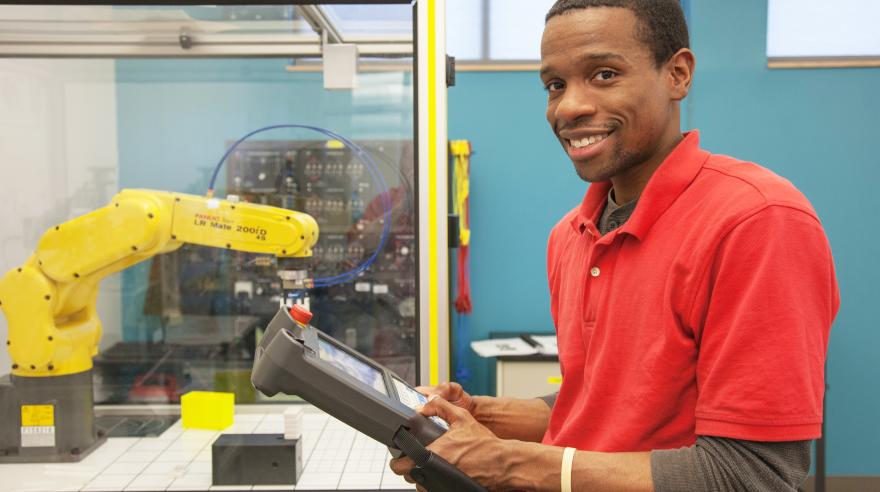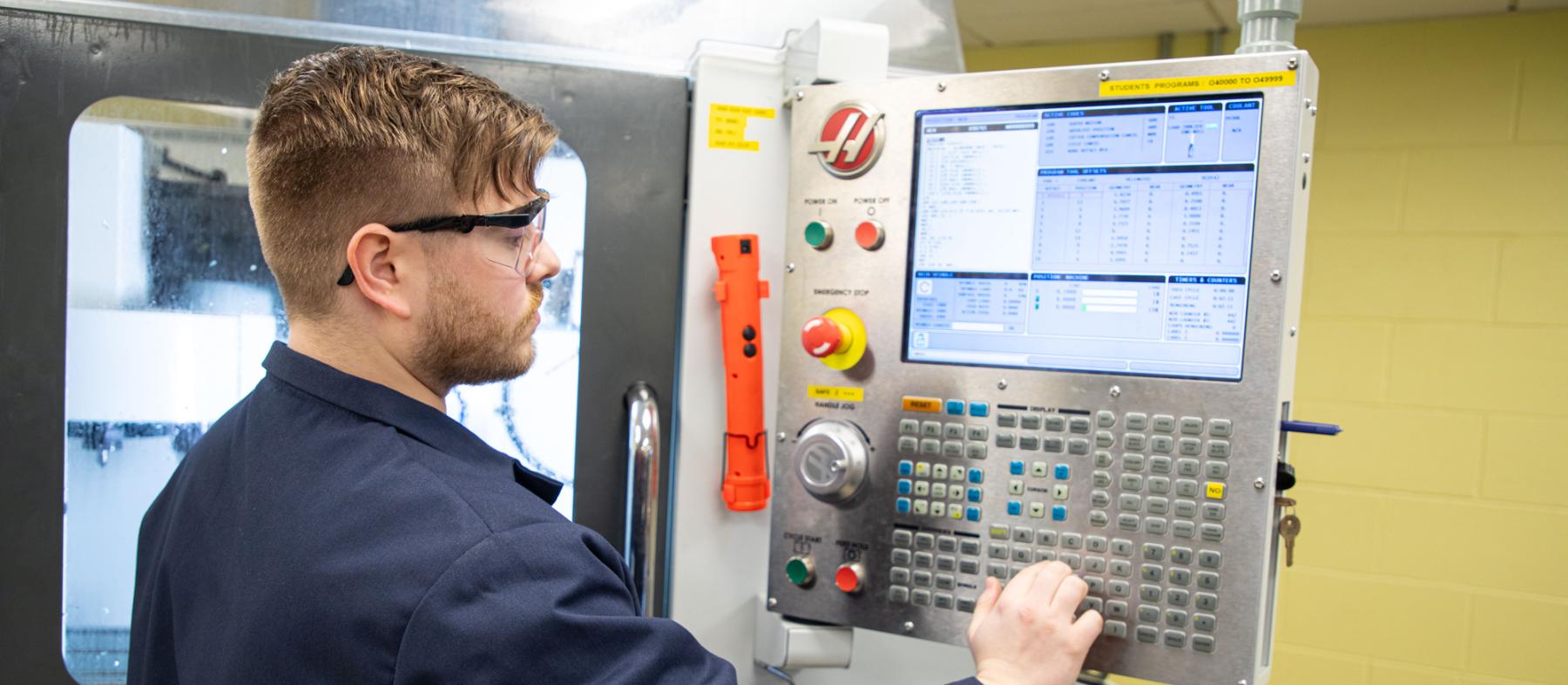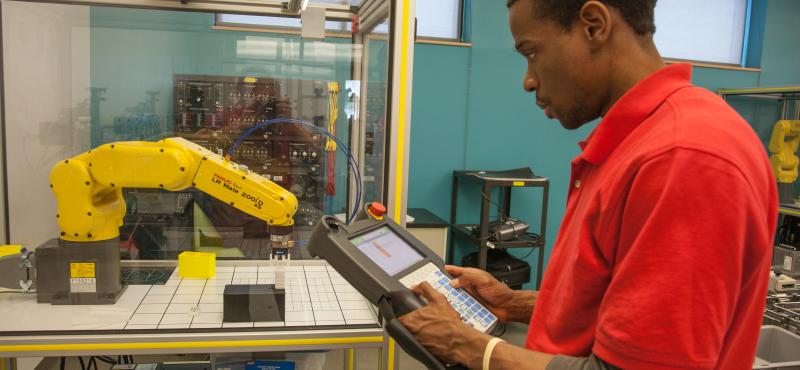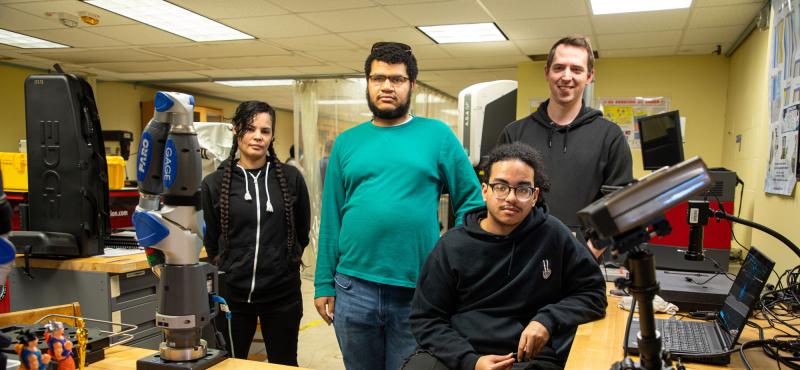Program Goals:
The Manufacturing Technology associate degree program is designed to prepare graduates to enter the field of advanced manufacturing. Students will gain an understanding of materials and manufacturing processes, as well as the quality systems in place in modern industry. Using safe working practices, students will learn to operate and maintain a variety of production equipment. Since there is a strong focus on applied mathematical and scientific knowledge in advanced manufacturing, students will obtain an advanced understanding of electrical, pneumatic, and hydraulic systems. Use of PCs, communication skills, CNC machine tools, and CAD/CAM software will allow successful graduates to enhance their ability to add value to any manufacturing environment. Graduates will be able to apply lean principles and automation techniques to improve process and product efficiency and quality.
Student Learning Outcomes:
Upon completion of the program, graduates will be able to:
- Apply mathematical and scientific concepts to solve manufacturing problems.
- Understand the process of product development through design and experimentation.
- Supervise and manage a variety of manufacturing systems.
- Work in multicultural and multidisciplinary teams to assess and improve system performance.
- Practice safe working protocols to nurture ethical responsibilities.
- Communicate technical information both verbally and in written form.
- Use modern tooling, skills, and techniques for effective manufacturing systems practice.
- Understand the behavior of a variety of material properties as they relate to manufacturing processing.
- Apply accurate design methodology and use industry standard CAD/CAM software to improve quality and production.
- Identify problems before they occur and design a solution.
- Understand and manage product variability as defined by quality systems.
- Apply advanced methods of analysis, synthesis, and control of manufacturing systems.
- Safely operate, program, and set up a variety of CNC equipment.
- Measure manufacturing process variables and draw credible technical conclusions.
- Apply lean principles in the operation and development of production systems.
Admissions Process:
Admissions inquiries should be directed to admissions@qcc.mass.edu. Prospective students may apply to the program of their choice by following the enrollment steps at www.QCC.edu/enrollment-steps.
Program Admissions Requirements:
Students should note that some first semester courses carry minimum prerequisites. Refer to the program grid.
- High School Diploma or GED/HiSET.
- Must be able to lift 50 lbs.
- Must have stable muscle control.
CORI, SORI, Finger Printing & Drug Testing:
Criminal Offender Record Information (CORI) and Sex Offender Registry Information (SORI) checks are not required. Fingerprinting and drug testing are not required.
- CORI/SORI checks, fingerprinting, and drug testing may be required of students enrolled in MNT 299.
Additional Cost:
See the Program Fees page.
- Graduates may be required to meet at off-campus locations and are expected to provide their own transportation to these venues. Types of venues used vary each semester, but may include company tours outside of class and/or training at other local educational facilities.
- Students should anticipate additional expenses for professional certification examinations.
Technical Performance Standards:
See the Technical Performance Standards page. (Note: Not all programs have technical performance standards).
Credit for Prior Learning:
Credit for Prior Learning (CPL) allows students to use skills they already have towards a college degree or certificate. Work, life, volunteer and military experience may be translated into credit, allowing students to take fewer classes and earn their degree faster. CPL eliminates redundancies for students who have already earned credentials or mastered skills required for their program of study. Email experience@qcc.mass.edu for more information and eligibility.
- To evaluate technical prior learning credit, students should contact the Center for Career & Transfer Services.
Career Outlook:
Please consult the Massachusetts Career Information System at https://masscis.intocareers.org/ or the Occupational Outlook Handbook at www.bls.gov/ooh/ for specific occupational information. The CIP code for this program is 15.0613.
Transfer Articulations & Opportunities:
Prospective students may learn more about transfer articulation agreements at www.QCC.edu/agreements. More information regarding transfer opportunities is available at www.QCC.edu/transfer.
Additional Information:
- The courses in this program are aligned with national standards as set by National Association of Manufacturers (NAM), National Coalition of Certification Centers (NC3), Haas CNC, OSHA, and Fanuc Robotics.
- During the course of this program, students will be required to take industry prescribed certifications. See program grid for details.
Certifications:





